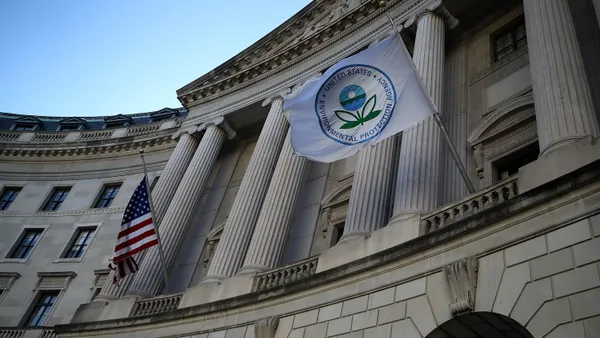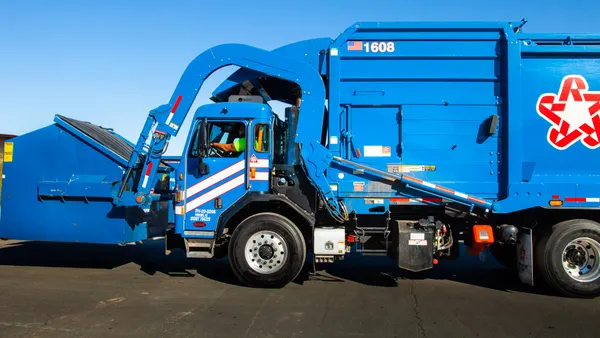UPDATE: September 24, 2019: Republic Services' 2030 greenhouse gas emissions reduction goals were recently approved by the Science Based Targets initiative (SBTi). This means the goals are verified as aligning with “the level of decarbonization required to keep global temperature increase well-below 2 degrees Celsius compared to pre-industrial temperatures.”
"By having their emissions reduction targets validated by the SBTi, Republic Services is ensuring that its targets are consistent with transformation at the scale and pace that science says is needed to prevent catastrophic global warming,” said Heidi Huusko, senior manager of environment and climate at the United Nations Global Compact, in a statement.
Republic is the only U.S. waste and recycling company to receive this approval to date.
Dive Brief:
- Republic Services has set new 2030 sustainability goals, including plans to reduce Scope 1 and Scope 2 greenhouse gas emissions by 35% compared to a 2017 baseline. Republic reported generating nearly 13.8 million metric tons of carbon dioxide equivalent in these categories in 2017, with a 2% decrease in 2018.
- The Arizona-based company has also pledged to increase recovery of "key materials" (cardboard, plastics, metals, organics, biogas and oil) by 40% and aims to increase biogas sent to "beneficial reuse" by 50%.
- On the safety side, Republic is striving to see zero employee fatalities and an OSHA Total Recordable Incident Rate (TRIR) of 2.0 or less. Republic has achieved the prior goal in past years, but had six fatalities in 2017 and two in 2018. The company's 2018 TRIR was 3.9.
Dive Insight:
Republic already reported achieving its 2018 sustainability goals, which were set in 2014, last year. Those included developing two landfill gas-to-energy projects per year, adding 150,000 tons of recycling capacity per year and reducing Scope 1 fleet emissions by 3%. Another goal to annually reduce the TRIR by 7% wasn't met, and remains "in progress" per the latest report, though Republic notes it's still performing better than the industry average.
These new goals go much further — albeit with a longer timeframe — and come from an updated assessment of the company's "most material business risks and opportunities." Republic conducted a similar materiality assessment in 2014, but this latest one drew on the U.N. Sustainable Development Goals established in 2015. Those goals also spurred Republic to set 2030 targets for maintaining employee engagement scores of 88% or above and reaching 20 million people through charitable giving.
The emissions reduction and recycling targets are the most notable in terms of how they compare to the only other industry player attempting anything on this scale — Waste Management.
Last year, Waste Management announced a "moonshot" target to offset four times the GHG emissions it generates from operations by 2038. This includes two new targets: reducing fleet emissions by 45% (from a 2010 baseline) and recycling 2 million more tons. Asked in January whether a 20-year timeframe was too long, given the narrow window for mitigating the worst climate effects, CEO Jim Fish told Waste Dive he recognized the urgency and anticipated the company would make progress even sooner.
Converting fleets from diesel to natural gas (or electric, as Republic is pursuing) has become fairly standard practice and emissions reductions can be expected as a result. Yet the vast majority of a waste company's Scope 1 emissions (and overall GHG emissions) generally come from landfills.
Republic's plan pledges to address those emissions directly within its network, whereas Waste Management's offset strategy does not. Neither company has reported its goals being approved by the Science Based Targets initiative yet, but it's questionable if a target based on emissions offsets from material that essentially passes through a company's control would qualify.
As for the recycling targets, Waste Management's pledge to recycle 2 million more tons of material represent an estimated 13% increase. Republic is aiming for a 40% increase, while including additional material categories such as biogas and oil. The company's reporting ties this into a broader circular economy viewpoint based on avoiding the effects of excess resource extraction and consumption.
While it's more common to see companies pursuing such plans in other countries, this is all still in the early stages for the U.S. waste and recycling industry. Many players still lack robust sustainability plans, let alone GHG reduction goals, but the conversation is becoming unavoidable.
Multiple waste executives interviewed about the climate crisis this year, including Republic President Jon Vander Ark, have recognized the risks and opportunities ahead. Still, it will take years to see consistent evidence of how committed companies are to their voluntary sustainability targets and whether they're willing to change decades-old disposal models in order to meet them.









